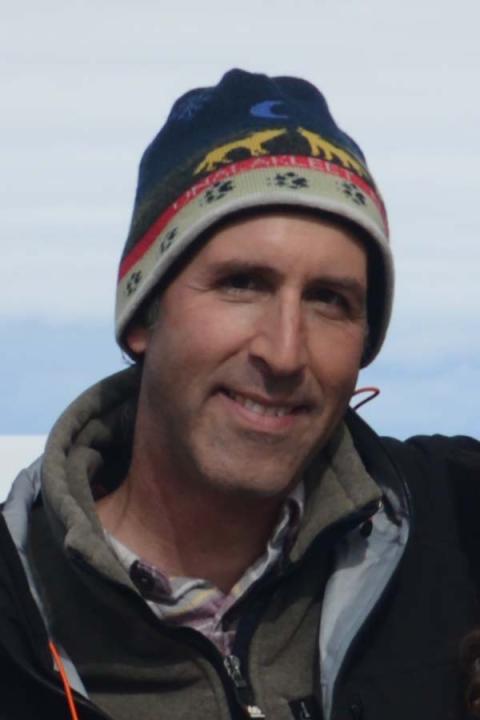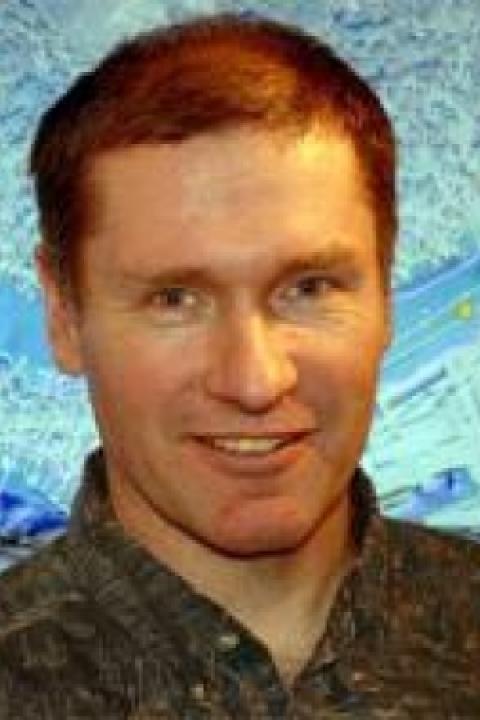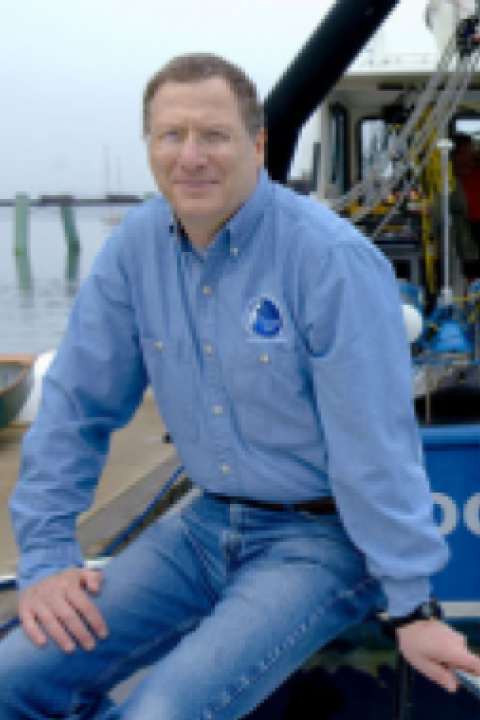The Oceanography (M.S.) master’s degree at UNH offers an interdisciplinary and research-intensive program at a top-tier research university. Ideal for those passionate about marine science, this program covers physical, biological, chemical, and geological oceanography. You'll engage in hands-on research in areas like coastal processes, ocean acidification, marine biogeochemical cycles, and climate change. With access to world-class facilities and expert faculty, UNH prepares you for a successful career in marine science, government, consulting, and beyond.
WHY GET A MASTER OF SCIENCE IN OCEANOGRAPHY?
Are you interested in the environment around you, and does a job or career in marine science appeal to you? Do your interests lie in the aquatic realm, specifically the marine system that includes oceans, estuaries and the atmosphere? Then you’re in luck! Students in the oceanography graduate program are trained in the broad sub disciplines (physical, biological, chemical and geological oceanography) and in their specialty field, and conduct research in topics including – but not limited to – coastal and estuarine processes, sedimentation and transport, ocean modeling, ocean acidification, climate change, ocean mapping, paleoceanography and climatology, primary productivity and microbial ecology of marine systems.
WHY CHOOSE UNH'S OCEANOGRAPHY PROGRAM?
Oceanography students at UNH can choose from a variety of research projects leading to post-graduate employment opportunities. Our faculty span the major disciplines of oceanography. Marine facilities at UNH include the Jackson Estuarine Laboratory, Coastal Marine Facility (and vessels), Shoals Marine Lab on Appledore Island, and a variety of research space in the Chase Ocean Engineering Laboratory, Ocean Processes Analysis Laboratory, Earth Sciences and Biological Sciences Departments, and the Center for Coastal and Ocean Mapping, a Joint Hydrographic Center with NOAA. Our graduates are well-suited to jobs that require knowledge of coastal and ocean processes, field data collection analysis, at-sea experience, modeling and laboratory techniques.
POTENTIAL CAREER AREAS
- Academic teaching
- Business
- Consulting firms
- Government research (NOAA/NRL/USGS/USACE)
- Research
- State regulatory agencies
Curriculum & Requirements
The Oceanography (OCE) graduate program has a diverse set of faculty, staff, and students who examine ocean processes in broad fields of physical, biological, chemical, and geological oceanography and geophysics. Basic and applied research of an experimental, numerical, and analytical nature is conducted in oceanic settings that range from shallow nearshore and estuarine waters to the deep ocean and span all ocean basins on earth including the Arctic.
OCE offers programs leading to M.S. and Ph.D. degrees. These interdisciplinary programs prepare students for professional careers in ocean-relate fields. In addition, students can also pursue an ocean mapping option within the Department of Earth Sciences and carried out within the Center for Coastal and Ocean Mapping.
Research and Facilities
The oceanography graduate program within the Department of Earth Sciences and the School of Marine Science and Ocean Engineering (SMSOE) is enhanced by the ocean engineering and marine biology graduate programs, and by other departments and institutes at UNH, including the civil and mechanical engineering and biology departments; the Institute for the Study of Earth, Oceans, and Space (EOS); the Center for Coastal and Ocean Mapping (CCOM); and the Ocean Processes Laboratory (OPAL). Other related programs include the N.H. Sea Grant Program, the Center for Collaborative Science, and the Atlantic Marine Aquaculture Center, Coastal Response Research Center (CRRC), Northeast Consortium (NEC), and the Piscataqua Region Estuaries Partnership (PREP). Oceanographic laboratories at UNH include the Shoals Marine Laboratory (SML) on Appledore Island, the Coastal Marine Laboratory (CML) in Newcastle, the Jackson Estuarine Laboratory (JEL) at Adams Point on the Great Bay, and the Chase Ocean Engineering Laboratory (COEL) on the main UNH campus. Additional laboratories for the oceanography faculty are located on campus in James, Morse, Rudman, and Spaulding Halls. The SMSOE operates a marine support facility and two UNH research vessels moored in Portsmouth Harbor at the UNH pier, the R/V Gulf Challenger and the R/V Gulf Surveyor, as well as a number of small boats. The SMSOE also supports the UNH Diving Program and oversees a shared use Instrumentation Pool for student and faculty use.
Admission Requirements
Applicants should have completed an undergraduate major related to one of the oceanography disciplines, including biology, chemistry, engineering, geology, physics, or mathematics, or an appropriate array of science and engineering courses within their major field. Applicants are expected to have completed one year each of calculus and chemistry and two semesters of physics and/or biology. It is not necessary to have had previous coursework in oceanography.
Degree Requirements
Students must complete a minimum of 30 credits for the thesis option or 34 credits for the non-thesis option.
| Code | Title | Credits |
|---|---|---|
| Required Courses | ||
| ESCI 997 | Seminar in Earth Sciences | 1 |
| ESCI 998 | Proposal Development | 1 |
| Select two courses from the following: | 6-8 | |
BIOL 855 | Biological Oceanography | |
ESCI 852 | Chemical Oceanography | |
ESCI 858 | Introduction to Physical Oceanography | |
ESCI 859 | Geological Oceanography | |
| Thesis/Non-Thesis Option | ||
| Select one of the following options: | 6 or 2 | |
| Thesis Option: | ||
OCE 899 | Master's Thesis (acceptable to the thesis-examining committee and must pass a thesis defense) | |
| Non-Thesis Option: | ||
ESCI 898 | Directed Research | |
or OCE 898 | Directed Research | |
| Other Relevant Graduate Courses | ||
| Select from the following courses: | 16-22 | |
BIOL 828 | Marine Bioacoustics | |
BIOL 873 | Physiology of Fishes | |
CEE 822 | Introduction to Marine Pollution and Control | |
ESCI 801 | Quantitative Methods in Earth Sciences | |
ESCI 820 | Ocean Measurements Lab | |
ESCI 834 | Global Geophysics | |
ESCI 841 | Geochemistry | |
ESCI 845 | Isotope Geochemistry | |
ESCI 847 | Aqueous Geochemistry | |
ESCI 849 | Ocean Biogeochemistry | |
ESCI 854 | Sedimentology | |
ESCI 856 | Geotectonics | |
ESCI 860 | Paleoceanography | |
ESCI 862 | Glacial Geology | |
ESCI 864 | Spectral Analysis of Geophysical Time Series Data | |
ESCI 865 | Paleoclimatology | |
ESCI 871 | Positioning for Ocean Mapping | |
ESCI 874 | Integrated Seabed Mapping Systems | |
ESCI 875 | Advanced Topics in Ocean Mapping | |
ESCI 896 | Topics (Nearshore Processes) | |
ESCI 972 | Hydrographic Field Course | |
ESCI 995 | Advanced Topics (Geophysical Fluid Dynamics) | |
ESCI 996 | Advanced Topics (Ocean Modeling) | |
ESCI 996 | Advanced Topics (Nearshore Hydrodynamics) | |
IAM 940 | Asymptotic and Perturbation Methods | |
MATH 835 | Statistical Methods for Research | |
MATH 839 | Applied Regression Analysis | |
MATH 845 | Foundations of Applied Mathematics I | |
MATH 853 | Introduction to Numerical Methods | |
ME 807 | Analytical Fluid Dynamics | |
ME 812 | Waves in Fluids | |
NR 844 | Biogeochemistry (or ESCI 896 Topics (Biogeochemistry)) | |
OE 853 | Ocean Hydrodynamics | |
OE 854 | Ocean Waves and Tides | |
OE 857 | Coastal Engineering and Processes | |
OE 865 | Underwater Acoustics | |
OE 995 | Graduate Special Topics (Coastal Sediment Transport) | |
ZOOL 810 | Sharks and Bony Fishes | |
| Total Credits | 30-34 | |
Accelerated Master's Overview
Accelerated Master’s programs offer qualified University of New Hampshire undergraduate students the opportunity to begin graduate coursework in select graduate programs while completing a bachelor’s degree. Accelerated master's programs are designed to provide students with an efficient and cost-effective pathway to earn both a bachelor's and master's degree or graduate certificate, enhancing career opportunities and long-term earning potential.
Accelerated Master's Highlights
- Begin studying advanced topics while an undergraduate student with the opportunity to complete a master’s degree or graduate certificate early.
- Master’s degree program students: Earn up to 12* graduate (800-level) course credits while completing a bachelor’s degree. This coursework will count as dual-credit toward both the bachelor’s and master’s degrees.
- Graduate certificate program students: Earn up to 8* graduate (800-level) course credits while completing a bachelor’s degree. This coursework will count as dual-credit toward both the bachelor’s degree and the graduate certificate.
- Students complete the bachelor’s degree, and then officially matriculate into the master’s or graduate certificate program to complete the remaining required graduate-level coursework.
*Some exceptions apply.
Accelerated Master's Admission Requirements
- A minimum 3.2 cumulative GPA is required.*
- A minimum of 90 undergraduate credits must be completed prior to enrolling in graduate (800-level) courses.
- Streamlined Graduate School Application (two letters of recommendation; most standardized tests and application fee are waived).*
*Some exceptions apply.
Accelerated Master's Requirements
- Students must attend a mandatory orientation session.
- Students must submit a special registration form each semester for dual-credit courses and note any DegreeWorks exceptions.
- Students may defer graduate matriculation for up to one year after earning their bachelor’s degree in most programs.
- See the Accelerated Master’s Catalog Policy and Accelerated Master’s Website for additional information and a list of programs. Note that some programs have additional requirements (e.g. higher-grade expectations) compared to the general policy.
Oceanography (M.S.) Accelerated Option
This graduate degree program is approved to be taken on an accelerated basis in articulation with the following undergraduate program(s):
| Code | Title | Credits |
|---|---|---|
| Earth Sciences (B.S.) | ||
| Students select from the following approved 800-level courses that can be completed in the undergraduate senior year for dual credit: | ||
| BIOL 855 | Biological Oceanography | 3 |
| ESCI 801 | Quantitative Methods in Earth Sciences | 4 |
| ESCI 820 | Ocean Measurements Lab | 4 |
| ESCI 852 | Chemical Oceanography | 3 |
| ESCI 858 | Introduction to Physical Oceanography | 3 |
| ESCI 859 | Geological Oceanography | 4 |
| ESCI 860 | Paleoceanography | 3 |
Program Learning Outcomes
Core Knowledge
- Demonstrate a foundation of knowledge in at least 2 of the main branches of oceanography: Geological, Biological, Physical, or Chemical.
- Geological Oceanography: An understanding marine geology and geophysics, including major geological features and history of the world’s oceans, processes of the ocean floor, composition and structure of the Earth, plate tectonic theory, marine sedimentology, and paleoceanography.
- Biological Oceanography: An understanding of marine ecosystems, primary and secondary productivity, trophodynamics, plankton diversity, zooplankton ecology, global ocean dynamics, and the physical and chemical processes that govern nutrient and light availability, the concept of food webs, role of microbes, and fisheries and anthropogenic interactions with fish stocks.
- Physical Oceanography: An understanding of the physics of the ocean, including general wind-driven and thermohaline circulation, geostrophic flow, upwelling, waves and tides, continental and nearshore processes. the effect of the earth’s rotation on large scale global ocean circulation, and instrumentation and methods used in obtaining observations.
- Chemical Oceanography: An understanding of the physical and biogeochemical process that determine the composition of seawater, including biological effects on chemistry, ocean nutrient cycles, air-sea gas exchange, radiogenic and stable isotopes as tracers of ocean properties, sediment and trace metal chemistry.
- Demonstrate basic knowledge of how the processes within the main branches of oceanography interact with each other.
- Demonstrate specialized knowledge of a field within oceanography sufficient to conduct substantive supervised research.
Research Methods and Analysis
- Identify and demonstrate knowledge of a range of qualitative and quantitative methodologies typically used in geochemistry research.
- Discover and critically read published research in the Earth sciences and related fields of mathematics, statistics, physics, chemistry, and biology.
- Frame empirical research and/or theory guided by prior knowledge.
- Implement a rigorous study using appropriate methods, measures and techniques.
- Critically evaluate and systematically analyze data to reach appropriate findings and interpretations.
Scholarly Communication
- Structure a coherent argument that rigorously presents and evaluates evidence to support claims.
- Review and cogently synthesize relevant literature.
- Write at a level and in a style of English consistent with that found in leading academic journals.
- Understand and properly use styles of citing, referencing, and formatting found in leading academic journals.
- Clearly convey research findings through oral presentation supported by appropriate digital media.
- Cogently summarize research and its significance to non-specialist audiences.
Professionalism and Pedagogy
- Prepare manuscripts that meet the standards of academic and research journals and respond appropriately to recommendations for revision.
- Demonstrate collaboration, leadership and teamwork.
- Create a welcoming environment that is supportive, inclusive and equitable.
- Make effective contributions to university, community and professional service.
- Communicate effectively to groups in a lecture format.
Deadlines
Applications must be completed by the following deadlines in order to be reviewed for admission:
- Fall: Jan. 15 (for funding); April 1 (final)
- Spring: Dec. 1
- Summer: N/A
- Special: N/A
Application fee: $65
Campus: Durham
New England Regional: VT
Accelerated Masters: Yes (for more details see the accelerated masters information page)
New Hampshire Residents
Students claiming in-state residency must also submit a Proof of Residence Form. This form is not required to complete your application, but you will need to submit it after you are offered admission, or you will not be able to register for classes.
Transcripts
If you attended UNH or Granite State College (GSC) after September 1, 1991, and have indicated so on your online application, we will retrieve your transcript internally; this includes UNH-Durham, UNH-Manchester, UNH Non-Degree work and GSC.
If you did not attend UNH, or attended prior to September 1, 1991, then you must upload a copy (PDF) of your transcript in the application form. International transcripts must be translated into English.
If admitted, you must then request an official transcript be sent directly to our office from the Registrar's Office of each college/university attended. We accept transcripts both electronically and in hard copy:
- Electronic Transcripts: Please have your institution send the transcript directly to grad.school@unh.edu. Please note that we can only accept copies sent directly from the institution.
- Paper Transcripts: Please send hard copies of transcripts to: UNH Graduate School, Thompson Hall- 105 Main Street, Durham, NH 03824. You may request transcripts be sent to us directly from the institution or you may send them yourself as long as they remain sealed in the original university envelope.
Transcripts from all previous post-secondary institutions must be submitted and applicants must disclose any previous academic or disciplinary sanctions that resulted in their temporary or permanent separation from a previous post-secondary institution. If it is found that previous academic or disciplinary separations were not disclosed, applicants may face denial and admitted students may face dismissal from their academic program.
Letters of recommendation: 3 required
Recommendation letters submitted by relatives or friends, as well as letters older than one year, will not be accepted.
Personal Statement/Essay Questions
Prepare a brief but careful statement regarding:
- Reasons you wish to do graduate work in this field, including your immediate and long-range objectives.
- Your specific research or professional interest and experiences in this field.
Important Notes
All applicants are encouraged to contact programs directly to discuss program-specific application questions.
International Applicants
Prospective international students are required to submit TOEFL, IELTS, or equivalent examination scores. English Language Exams may be waived if English is your first language. If you wish to request a waiver, then please visit our Test Scores webpage for more information.
Explore Program Details
An applicant to the M.S. program is expected to have completed one year of calculus and at least four semesters of college chemistry, physics, and/or biology; and to have an undergraduate degree or equivalent in geology, chemistry, physics, mathematics, engineering, or the biological sciences. Students lacking some background in a particular area may be admitted provided they are prepared to complete courses, without graduate credit, in which they may be deficient. The program of study a student wishes to follow and the student's undergraduate major determine the level of preparation necessary. The preparation of each student is determined before the beginning of the first semester in residence in order to plan the course of study. Each entering student is assigned an academic adviser to assist in planning a program of study.
Admission decisions will be based on:
- Alignment with and advocacy from a potential advisor. Prospective students should reach out directly to faculty with relevant research interests to ensure that the faculty member is actively recruiting students and that a relevant research project can be identified.
- Academic preparation, as documented by relevant academic courses and grades, relevant work experience, standardized test scores (if submitted), and successful completion of relevant degree programs. Students lacking some background in a particular area may be admitted provided they are prepared to complete courses, without graduate credit, in which they may be deficient.
- Scholarly potential (research, technical, oral communication, and written communication skills, acquired both from academic and non-academic settings), as documented by recommendation letters and personal statement.
- Persistence, motivation, and realistic self-appraisal, as documented by their personal statement and recommendation letters.
- Potential to capitalize on their unique experiences, perspectives or talents to contribute to the scholarly community at UNH, as documented by recommendation letters and their personal statement.















